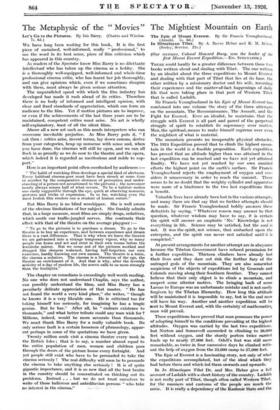The Metaphysic of the " Movies"
WE have long been waiting for this book.. It is the first piece of sustained, well-informed, really " professional," to use the word in its best sense, piece of film criticism which has appeared in this country.
As readers of the Spectator know Miss Barry is no dilettante intellectual who has taken up the cinema as a hobby. She is a thoroughly well-equipped, well-informed and whole-time professional cinema critic, who has learnt her job thoroughly, and can give opinions which, even if we sometimes disagree with them, must always be given serious attention. The unparalleled speed with which the film industry has developed has made it rush ahead of its critics. Therefore there is no body of informed and intelligent opinion, with clear and fixed standards of appreciation, which can form an audience to the film. Yet if motion pictures are to improve, or even if the achievements of the last three years are to be maintained, competent critics must arise. No art is wholly self-explanatory, least of all the silent films.
Above all a new art such as this needs interpreters who can overcome inevitable prejudice. As Miss Barry puts it, " ask then : critics arise, invent terms, lay down canons, derive from your categories, heap up nonsense with sense and, when you have done, the cinemas will still be open, and we can all flock in as proudly as we do now to the theatre and the opera, which indeed it is regarded as meritorious and noble to sup- port."
Here is an important point often overlooked by audiences :-
" The habit of watching films develops a special kind of alertness. Every habitual cinema-goer must have been struck at some time or another by the comparative slowness of perception and under- standing of a person not accustomed to the pictures ; the newcomer nearly always misses half of what occurs. To be a habitué makes one easily suggestible through the eye, quick at observing manners, gestures and tricks of expression. In so far, watching even the most foolish film renders one a student of human nature."
But Miss Barry is no blind worshipper. She is well aware of the obvious limitations of her subject. She frankly admits that, in a large measure, most films are simply drugs, sedatives, which sooth our traffic-jangled nerves. She contrasts their effect with that of the theatre on the average playgoer :--
" To go to the pictures" is to pin:chase a dream. To go to the theatre is to buy an experience, and between exverience and dream there is a vast difference. That is why when we leave the theatre we are galvanised into a strange temporary vigour, why so many people run home and act and strut in their own rooms before the wardrobe mirror. But we come out of the pictures soothed and drugged like sleepers wakened, having half-forgotten our own existence, hardly knowing our own names. The theatre is a tonic, the cinema a sedative. The cinema is a liberation of the ego, the theatre an enrichment of it. And that is why, after the feverish activity of a day of modern life, the screen calls to us more strongly than the footlights."
The chapter on comedians is exceedingly well worth reading. No one who does not understand Chaplin, says the author, can possibly understand the films, and Miss Barry has a peculiarly delicate appreciation of that master. " He has not found the world a very kind place," she writes, " though he knows it is a very likeable one. He is criticized too for taking himself too seriously, for imagining he has a tragic genius. But he has." After all, he " endears existence to thousands," and What better tribute could any man wish for ? Millions, indeed, would be more accurate than thousands. We must thank Miss Barry for a really valuable book. Its only serious fault is a certain looseness of phraseology, appar- ent perhaps in some of the quotations we have given.
Twenty million souls visit a cinema theatre every week in the British Isles ; that is to say, a number almost equal to the entire population of men, women and children pass through the doors of the picture house every fortnight. And yet people still exist who have to be persuaded to take the cinema seriously The real difficulty will soon be to persuade the cinema to take anything else seriously ! It is of quite gigantic importance, and it is so new that all the best brains in the country should be concentrated on thinking out its problems. Instead ,„ . but we do not trust ourselves to write of those ludicrous and antediluvian persons " who take no interest in the cinema:"














































 Previous page
Previous page